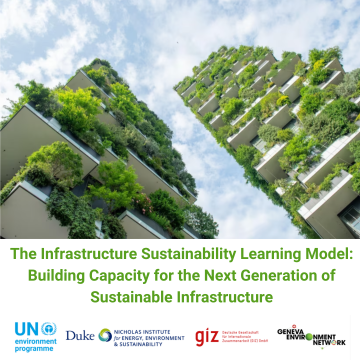
On 12 June 2023 (13:00 -14:00 CEST), the United Nations Environment Programme, the Nicholas Institute for Energy, Environment & Sustainability at Duke University, and GIZ, within the framework of the Geneva Environment Network, will present the Infrastructure Sustainability LEarning (ISLE) model as a means of supporting countries in implementing UNEA Resolutions 4/5 and 5/9 on sustainable and resilient infrastructure.
As infrastructure spending ramps up, an urgency exists to streamline access and familiarity with sustainable infrastructure guidance, tools, and best practices. The adoption of an Infrastructure Sustainability LEarning (ISLE) model, adapted from the ECHO Model used in the medical community, is a scalable, effective, and low-cost capacity building approach for sustainable infrastructure specialists and practitioners.
During this event, we will hear from partners who adapted the ECHO learning model from the health sector to apply it in a pilot series of virtual learning sessions for infrastructure practitioners from over 70 countries, their ideas for scaling the model, and how to leverage existing tools like the Sustainable Infrastructure Tool Navigator into a framework that can be used to connect global learners to common resources. The event will end with an open discussion and networking session to explore potential collaborations for advancement.
Laura Platchkov - Senior Policy Advisor, Federal Office for the Environment, Switzerland
Rowan Palmer - Programme Management Officer, Resources and Market Branch, UN Environment Programme
Elizabeth Losos - Executive in Residence, Duke University
Sara Mason - Senior Policy Associate, Duke University
Mira Piel - Junior-Advisor, Deutsche Gesellschaft für Internationale Zusammenarbeit (GIZ)
During the fifth session of the UN Environment Assembly (UNEA), which met in Nairobi in 2022, Members States adopted a resolution on Sustainable and Resilient Infrastructure (UNEP/EA.5/Res.9). This new resolution builds on a 2019 UNEA resolution (UNEP/EA.4/L.5) by encouraging Member States to:
- implement the International Good Practice Principles for Sustainable Infrastructure;
- promote investment in sustainable and resilient infrastructure, natural infrastructure and nature-based solutions;
- cooperate internationally to strengthen frameworks, including for financing; and
- provide opportunities for engaging relevant stakeholders.
The International Good Practice Principles for Sustainable Infrastructure set out ten guiding principles that policymakers can follow to help integrate sustainability into infrastructure planning and delivery. The individual principles and case studies were developed via ongoing global consultation and inputs from experts and UN Member States, as part of the implementation of UNEA Resolution 4/5 on Sustainable Infrastructure. The principles are now reflected in a subsequent UNEA Resolution 5/9.
Links
To follow the event online, please register on Webex.
